A Community Says ‘No’ to a Massive Climate-Polluting Refinery
Under legal and public pressure, a developer abandoned plans to build a methanol refinery in Kalama, Washington, that was set to become one of the top climate polluters in the state.
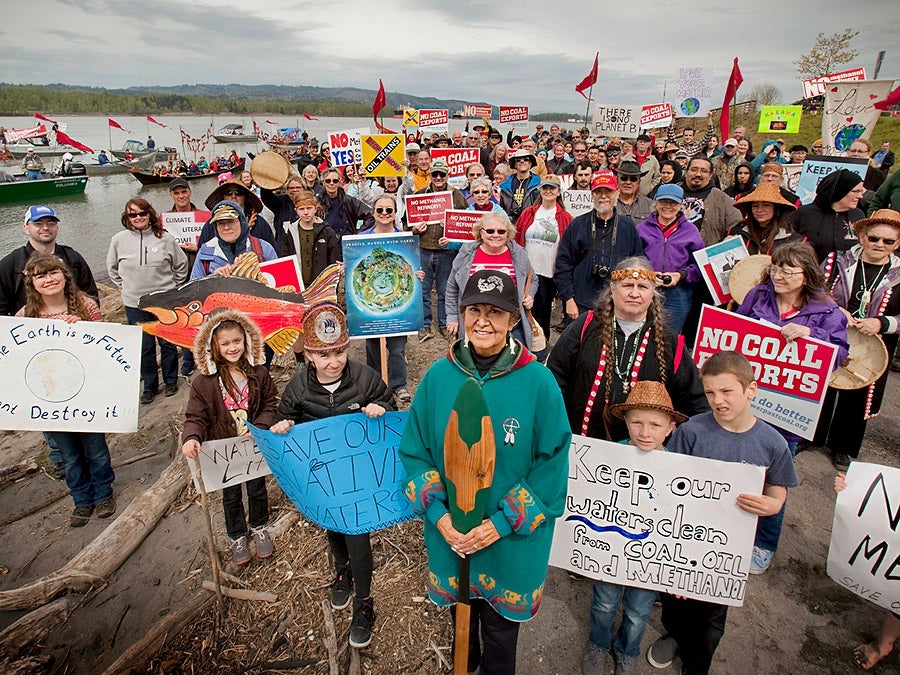
This page was published 4 years ago. Find the latest on Earthjustice’s work.
A heat wave hit the Pacific Northwest this June that sent temperatures to an unprecedented high above 115 degrees. The news became another shocking moment in the unfolding climate crisis.
But something else happened here in June that offers hope.
Under legal and public pressure, a developer abandoned plans to build a methanol refinery in Kalama, Washington, that was set to become one of the top climate polluters in the state. The project would have consumed more fracked gas per day than all of Washington’s gas-fired power plants combined.
The win was the result of activists and Earthjustice lawyers coming together for a six-year opposition campaign and a nail-biting legal battle. And it marked the 11th time in a decade that a fossil fuel export project had surfaced in the Northwest, faced public backlash and legal challenges, and eventually died.
“Projects like this simply cannot go forward as we fight to save our climate,” says Kristen Boyles, managing attorney of Earthjustice’s Northwest Regional office. “The climate-killing emissions from this project would have overwhelmed Washington, and we must keep drawing the line and saying no.”
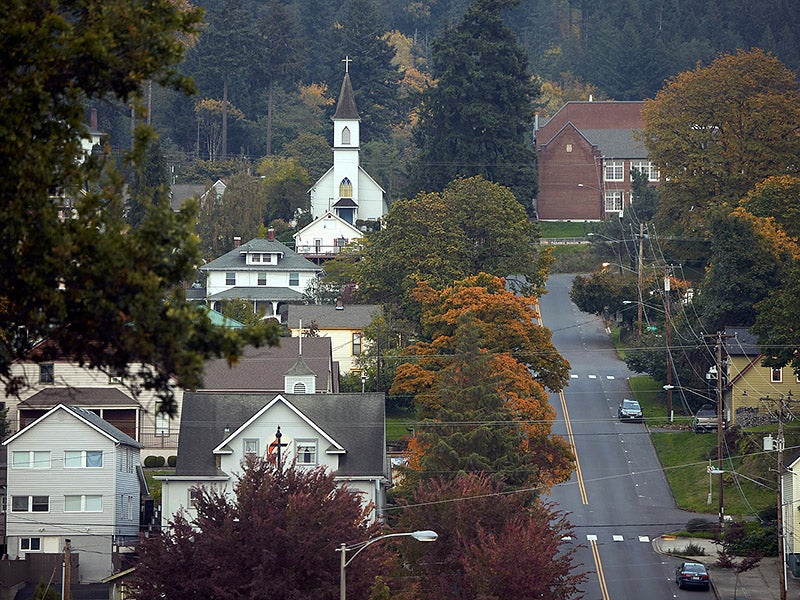
Houses dot the hillside of Kalama, Wash., on Oct. 19, 2021. (Mason Trinca for Earthjustice)
News spreads fast, particularly in small towns like Kalama. But the full truth — that can take a long time to uncover.
Cambria Keely first heard when she was 14, on a road trip with her parents in 2015. Her mom, Sally Keely, was checking Twitter and suddenly said out loud, “This is crazy! Did you know they are putting in a methanol refinery?”
Cambria had no idea what a methanol refinery was. Most people in the region didn’t either. But she heard the concern in her mother’s voice. Something threatening was coming to Kalama, her hometown of 3,000 people along the Columbia River.
Cambria grew up exploring a five-acre wooded lot on Kalama’s outskirts. When she took daytrips down to the river, she would stop in town for ice cream. Woods and water were the classroom for this homeschooled teen.
As she learned more about the refinery, Cambria started going into town for a new reason: to speak out at hearings and join protests against the proposal.
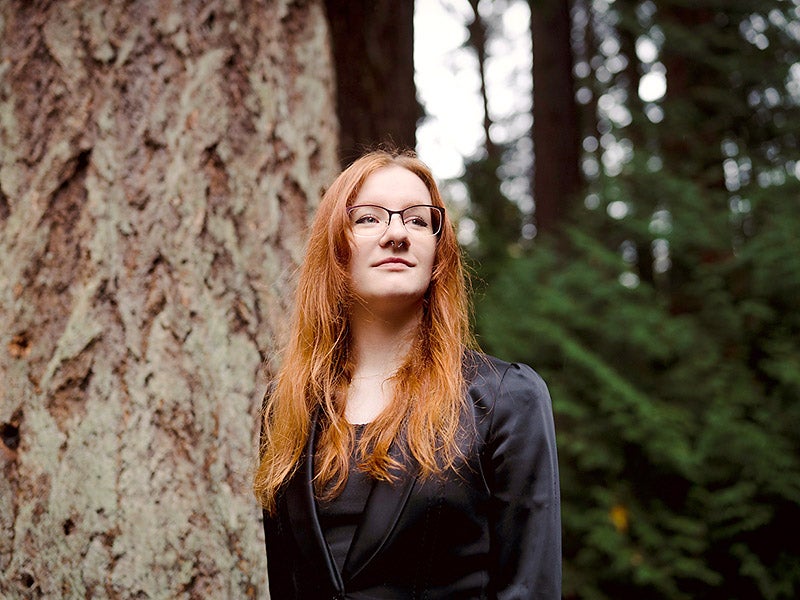
Cambria Keely, in Bellingham, Wash. (Jovelle Tamayo for Earthjustice)
Some of these local activists knew part of the bigger picture. The Pacific Northwest is an ongoing battlefield, where climate activists and Earthjustice lawyers are beating back a relentless set of schemes from fossil fuel companies.
For more than a decade, industry has been descending upon port cities such as Longview, Vancouver, Tacoma, and others. Taking note of existing rail lines, gas pipelines, the Columbia River, and access to the Pacific Ocean, agents of the fossil fuel sector view these locales as ideal for setting up shop.
“The Pacific Northwest stands squarely between the most voracious energy markets in the world and huge fossil fuel deposits in the interior of North America…. Big energy companies plan to unearth these vast reserves of carbon-intense fuels and put them up for sale in Asia,” Eric de Place of the Sightline Institute wrote in a 2014 article. “So it is by geographic accident that the Northwest, perhaps the greenest corner of North America, will play an outsize role in determining the planet’s climate future.”
When local activist Linda Horst first heard about the Kalama refinery, she was already a veteran of the fight in Longview to stop plans for the largest coal-export facility in North America. She had met people living alongside rail lines who had to hang blankets in their windows to keep out the black coal dust.
Horst worried that Kalama didn’t know the full extent of what was coming.
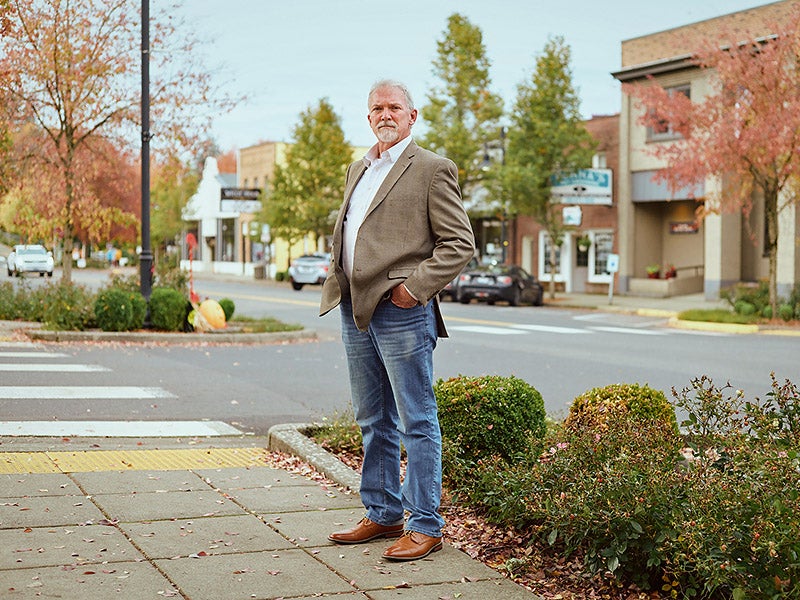
Mayor Mike Reuter of Kalama, Wash. (Mason Trinca for Earthjustice)
The mayor of Kalama, Mike Reuter, started out in favor of the proposed refinery. The pitch sounded promising.
“Money, tax revenue, and jobs — that is what spoke to the people in Cowlitz County,” he says.
Northwest Innovation Works’ plan for the Port of Kalama involved piping in fracked gas and converting it to methanol, a toxic liquid alcohol used as a solvent, a fuel, or — as was the plan here — as a feedstock for olefins, which are used to make plastics. The methanol would be shipped to China from Kalama’s river port for plastics production.
Proponents had carefully prepared for an early public hearing in March of 2016.
“The port had kept this under wraps,” Horst explains. “They knew people weren’t going to be thrilled. Well, we weren’t.”
Developers had already hit the pavement behind the scenes, making promises, she says, so that a united front of refinery supporters clad in identical green shirts occupied many of the seats in the hearing room. Horst was alarmed. Developers sold it as an operation that would adhere to top-notch environmental standards, and many people seemed to believe them.
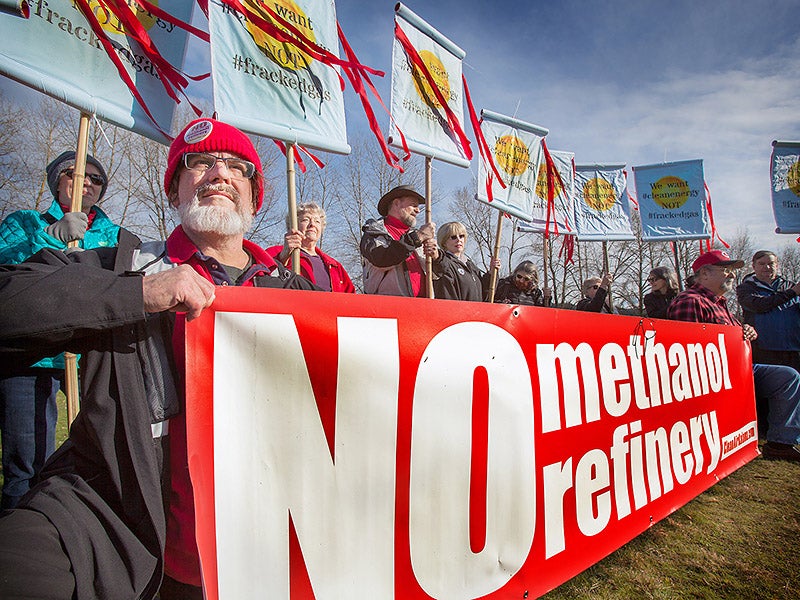
Local activists protest a proposed methanol refinery in Kalama, Wash., in 2017. (Rick Rappaport)
The developers started hiring former and current local political leaders, building further momentum. But the mayor, activists, environmental groups, and Earthjustice lawyers all started asking questions, bringing the full truth out.
“We had to become knowledgeable about petrochemicals, the rail industry, gas pipelines, and the natural gas industry,” says Diane Dick, a volunteer researcher who, along with Horst, is part of a grassroots group called Lower Columbia Stewardship Community.
Dick got involved a couple of years before Cambria joined the opposition campaign. As Cambria got to know the group, Dick stood out. Nicknamed “the bulldog,” she would research the facts, know them cold, and stop at nothing to be heard.
“Any fossil fuel company should be cautious of letting Diane get a whiff of them,” Cambria says.
Reuter, the mayor, also started to poke at some of the company’s promises. He researched the principals at Northwest Innovation Works but found no evidence that they’d ever worked at a methanol refinery, let alone built one. Their blueprints were sketchy at best.
“The refinery would be built in China, sent to America, and put together like a Lego set,” he says. The 200 jobs promised looked iffy.
“I started Google Earthing every methanol refinery around the world, to see how many cars were parked in the parking lots,” he explains. He saw 12 here, 15 there — and knew the jobs would never materialize.
Reuter flipped to become the most outspoken opponent of the plan. And the information activists started to compile caused opposition to grow.
Opponents realized it was unlikely that an existing pipeline would have capacity for the gas the refinery would use. That would mean another new and much bigger pipeline, locking in reliance on fracked gas for decades to come.
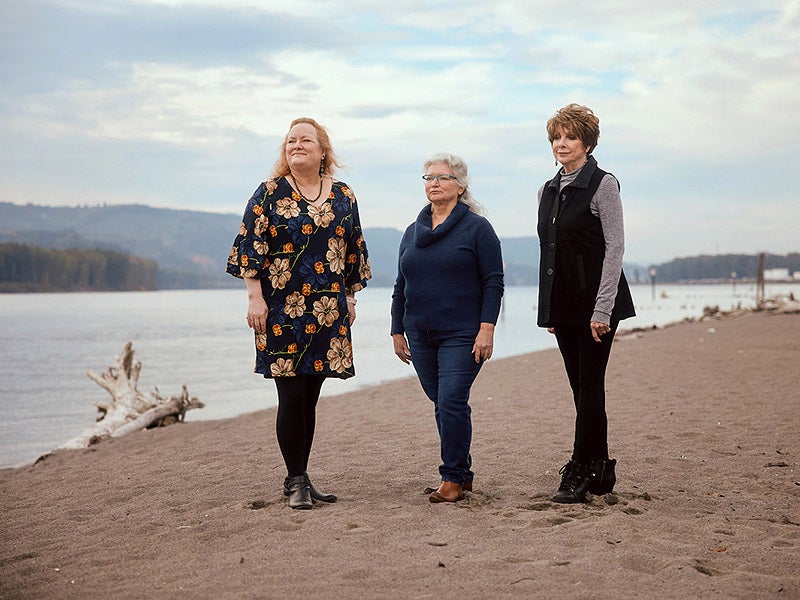
Sally Keely, Diane Dick, and Linda Horst, on the bank of the Columbia River near Kalama, Wash. (Mason Trinca for Earthjustice)
In early 2017, Earthjustice attorneys Janette Brimmer and Amanda Goodin, who were part of a broader team that handled the case, attended a hearing about the refinery proposal.
There they met up with advocates from Columbia Riverkeeper, an organization that has partnered with Earthjustice on many regional fights including the campaign against the Tesoro Savage oil terminal proposed for Vancouver, Washington. Brimmer says that to the lawyers and advocates from Columbia Riverkeeper, one point was clear: “It is a carbon bomb. It would have been one of the single largest greenhouse gas emitters in the state.”
Informed by their work against Tesoro Savage, Columbia Riverkeeper knew that the climate implications of the project could be used to challenge it — but Earthjustice’s legal expertise was required to turn that hook into a legal strategy.
The amount of carbon emitted from the plant “was important,” Brimmer explains, “because under the law we were using and applying, that was a big factor.” Using Washington’s State Environmental Policy Act, they were able to show that the developers had failed to disclose upstream and downstream effects.
Earthjustice’s legal team, working on behalf of Columbia Riverkeeper, Washington Environmental Council, Washington Physicians for Social Responsibility, Center for Biological Diversity, and Sierra Club, took on the refinery proposal using several legal hooks. At the state level, litigation focused on the project’s greenhouse gas emissions, the potential for the methanol to be used as a fuel (for even more emissions), and the project’s location on state shorelines.
Wins in the state litigation forced two supplemental environmental reviews. Each review further documented the climate harm, giving ammunition to state regulators.
On the federal side, Earthjustice brought a challenge to the U.S. Army Corps of Engineers’ permit under the National Environmental Policy Act and the Clean Water Act, and the federal district court vacated needed permits, sending the project back to the drawing board.
After years of on-the-ground organizing, campaigning, and legal battles, Washington’s Department of Ecology finally came around. The department, seeing volumes of new information brought forward by Earthjustice litigation and the public, denied a key permit.
The refinery developers — also seeing the mounting opposition — announced they would abandon the project.
“That was a combination of public opposition and our legal tools,” Brimmer says.
For Cambria Keely, the fight was transformative. Homeschooling had sometimes made her feel distant from her community. Activism changed that.
“Now they are my closest friends,” she says. “We are like a huge support system to one another.”
Inspired by the victory, she decided to study science and policy at Western Washington University to prepare for a career in environmental advocacy. For now, the string of victories across the Pacific Northwest are holding.
Columbia Riverkeeper is tracking Northwest Innovation Works for any new methanol refinery proposals. Jasmine Zimmer-Stucky, a former organizer with the group, sums up the region’s climate change pivot: “We were digging a hole,” she says, “but now at least we’ve finally put down the shovel.”
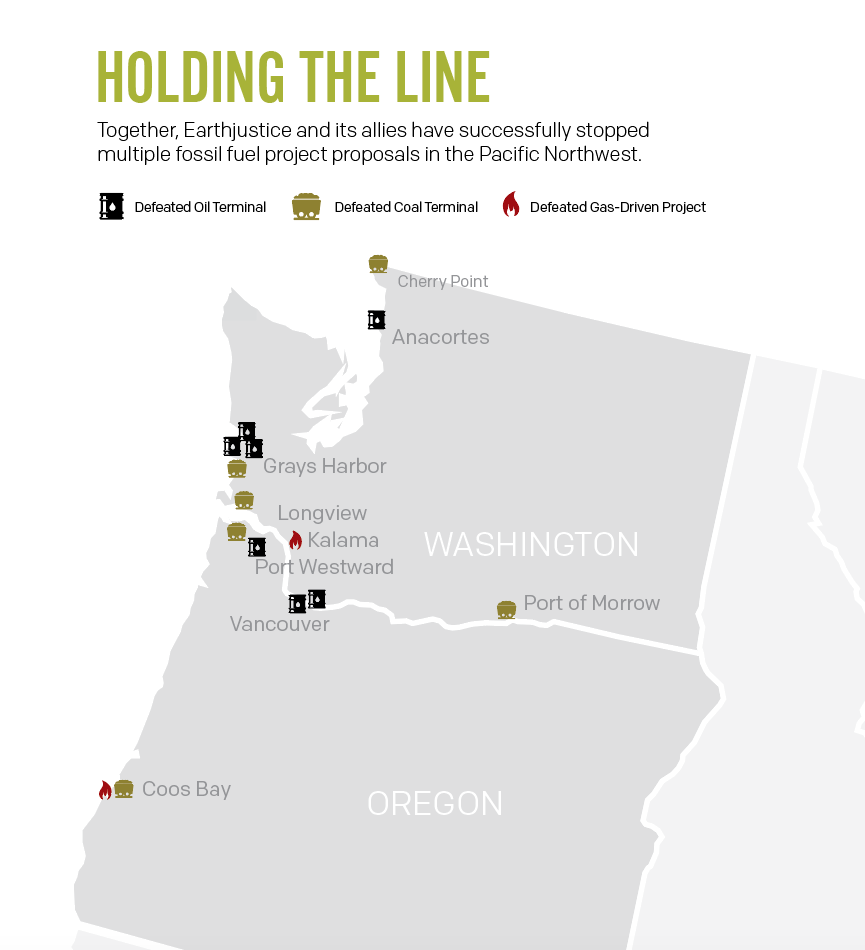
(Infographic by Earthjustice)
Established in 1987, Earthjustice's Northwest Regional Office has been at the forefront of many of the most significant legal decisions safeguarding the Pacific Northwest’s imperiled species, ancient forests, and waterways.